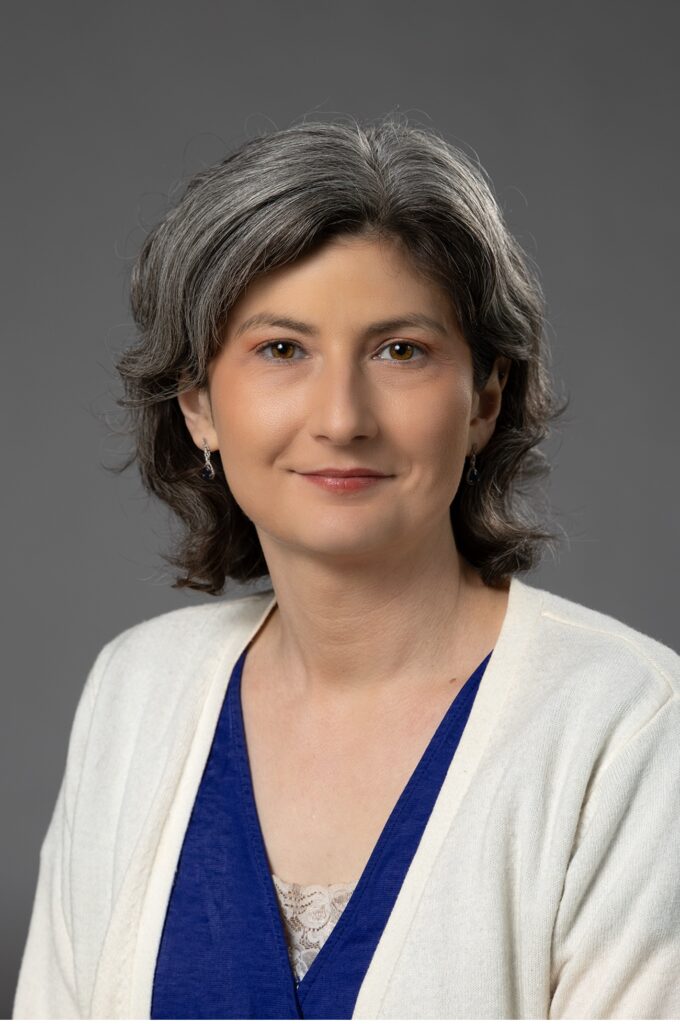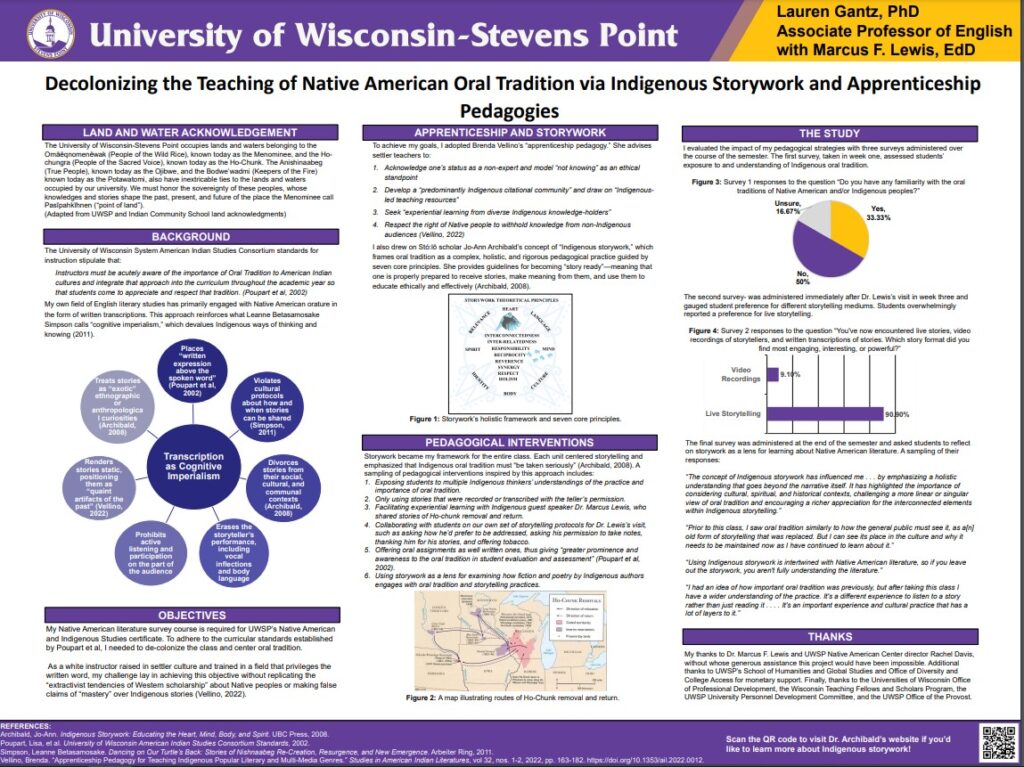University of Wisconsin-Stevens Point
Associate Professor and Women’s and Gender Studies Coordinator
Wisconsin Teaching Scholar, 2023-24
When I arrived at the University of Wisconsin-Stevens Point in 2016, I had no inkling that the scholarship of teaching and learning would come to dominate my research agenda. I simply knew that teaching would take up the bulk of my time (a standard load in my department is 4/4) and that I would be working with a student population much different than the one I’d taught at the large state school where I completed my PhD.
My primary responsibility in the English Department is to teach our multiethnic literature courses, and after my first semester I made what I now recognize as a “rookie” mistake. UWSP is a predominantly white institution, so I saw my role in terms of “un-teaching”–deconstructing harmful stereotypes and dismantling sanitized versions of the American past. The essays and student evaluations I received that semester drove home a fact that is copiously documented in SoTL on this subject. Focusing on what white students need to “un-learn” centers them at the expense of my BIPOC students and reinforces the idea that ethnic literature is, as Bonnie TuSmith puts it, “oppression” literature rather than “human stories of human beings living human lives.” Determined to correct my mistake, I stumbled into the realm of SoTL without realizing it, reading copiously about liberatory frameworks for teaching multiethnic literature so I could revamp my class.
From that early mistake, my interest in SoTL was born. I took a few tentative forays into the field, presenting papers on pedagogy at the Midwest Modern Language Association conference in 2018 and 2021. The first arose from my initial research about the teaching of multiethnic literature and focused on getting students to view literature by BIPOC writers as art rather than ethnography. The second developed from my growing interest in the teaching of graphic narratives and examined how graphic anthologies by Indigenous artists can help students understand decolonial politics. I discovered that I really enjoyed writing about teaching, and I had a lot to say on the subject. Emboldened by these early experiences, I drafted a book chapter about the teaching of Hmong American literature, which was just released as part of an edited collection this fall.
Prior to my participation in the Wisconsin Teaching Fellows and Scholars program, I’d been doing my SoTL work in what felt like isolation (with the exceptions of conference Q & A sessions, a handful of webinars, and an online course development institute). I’d not found a scholarly community of practice. The promise of finding that community is what made the WTFS program attractive to me. Here, at last, was an opportunity to talk with people who cared just as much about teaching and social justice as I did.
While I absolutely found a sense of scholarly community through WTFS, the program gave me so much more than I expected. In the wake of the pandemic and system-wide austerity measures that tasked fewer faculty with ever more responsibilities, I was overwhelmed. Our students needed so much more from us than before. Although I did my best to deny it, I was burned out—and I didn’t realize how seriously until I attended faculty college and the WTFS summer institute in 2023. Surrounded by brilliant, supportive colleagues from across the UW System, I felt a burden lift. I was seen and held in a way I’d sorely needed. Sharing ideas with folks from a multitude of disciplines and seeing inspiring examples of SoTL work from former WTFS participants made me excited about teaching again. For the first time in a long while, I remembered—and believed—a line from bell hooks’s Teaching to Transgress that I’d once used in my teaching philosophy: “the classroom, with all its limitations, remains a location of possibility.”
The project I crafted through WTFS focused narrowly on my Native American literature survey course. Like much of my previous SoTL work, it was concerned with how to approach ethnic literatures in a way that is empowering for BIPOC students and effective for white students. I’d taught the class before and often struggled with teaching Native American oral tradition—as a literature scholar, I’m trained in textual analysis above all else. Yet I knew that written transcriptions of orature were inadequate; they erased the nuances of live storytelling and the cultural context that made the stories so powerful. Based on my previous experiences, transcriptions also reinforced the common misconception among non-Native students that orature is an outdated or obsolete form of narrative. I reworked the class to center oral tradition using high impact practices such as inviting a member of the Ho-Chunk nation to do a live storytelling, asking students to collaborate on group presentations to provide context for our reading, and requiring students to reflect on their learning experiences. I also de-centered written assessment methods by offering students the option to complete oral presentations in lieu of research papers. I’m only a year out from this project but found student feedback on their learning experiences illuminating. I’ve deployed some of what I learned in my other courses, and plan to revisit this project when I teach Native American literature again next fall.
My primary focus will always be the teaching of multiethnic literatures, but WTFS piqued my interest in other realms of SoTL. I’ve become a “frequent flyer” of programming offered by our Center for Inclusive Teaching and Learning, because I want to continue expanding my knowledge of SoTL and maintain the sense of scholarly community I felt at WTFS. Over the summer, I completed a course redesign short to rework a major assignment in my first-year writing class that’s proven to be a stumbling block for some students, and I began an online course about teaching with A.I. During the 2024-2025 academic year, I’m participating in two faculty communities of practice—one about creating effective instructional videos and one about high impact practices. I’ll also be working with CITL to create resources for trans-inclusive pedagogy and student entrance/exit surveys to assess our Women’s and Gender Studies minor.
WTFS was truly a formative experience in my professional life, and I believe it represents the UW System at its best. Here’s to another 25 years!
Biography:
Lauren Gantz arrived at the University of Wisconsin-Stevens Point in 2016. She specializes in American ethnic literatures, with additional interests in women’s and gender studies, refugee studies, postcolonial studies, and graphic novels. Her research focuses on the ways in which diasporic Caribbean writers appropriate, create, or interrogate archives to negotiate historical trauma and national identity. She has also researched and written on the scholarship of teaching and learning, particularly as it relates to the teaching of Hmong American literature and Native American oral tradition.
Professor Gantz is currently serving as the coordinator of the Women’s and Gender Studies minor and as co-president of the Stevens Point Academic Representation Council. She also advises Sigma Tau Delta, the English honor society, and serves on the Equity, Diversity, and Inclusivity Policy Committee for Common Council. In the summers, she teaches for the college-prep program Upward Bound.
SoTL Work:
PUBlications:
“Reading Refugitude: Critical Frameworks for Teaching Hmong American Literature.” Race in the Multiethnic Literature Classroom, Eds. Cristina Stanciu and Gary Totten, U of Illinois Press, 2024, pp. 68-88.
Presentations:
Wisconsin Teaching Fellows and Scholars Poster Presentation. Universities of Wisconsin Office of Professional Instruction and Development Spring Conference on Teaching and Learning: The Joys of Teaching and Learning: Engaging Students. Madison, WI. 2024.
“Practicing Hope: Instructor Burnout as a Social Justice Issue.” Keynote co-presented with Laura Anderson-McIntyre, Valerie Barske, James Berry, Jess Bowers, Jodi Olmstead, Saemyi Park, and Erin Speetzen. UWSP Teaching Conference: Teaching for Social Justice. Stevens Point, WI. 2023.
“De-Colonizing the Classroom: Designing Policies for Equity and Diversity.” Co-presented with Valerie Barske and Jess Bowers. UWSP Teaching Conference: Teaching for Social Justice. Stevens Point, WI. 2023.
“Graphic Anthologies as Anticolonial Resistance: Teaching Deer Woman.” MMLA Convention: Cultures of Collectivity. Milwaukee, WI. 2021.
“‘Ethnic Literature’s Hot’: Reflecting on the Consumption of Multiethnic Literatures,” MMLA Convention: Consuming Cultures. Kansas City, MO. 2018.
Service:
Co-Organizer, “Decolonize Your Syllabus Workshop,” sponsored by the University of Wisconsin-Stevens Point Center for Inclusive Teaching and Learning and the Departments of History and Philosophy. Stevens Point, WI. 2019.
Professional Development:
Online Video Creation Faculty Learning Community, University of Wisconsin-Stevens Point, Center for Inclusive Teaching and Learning. Stevens Point, WI. 2024-2025.
Community of Practice: High Impact Practices, University of Wisconsin-Stevens Point, Center for Inclusive Teaching and Learning. Stevens Point, WI. 2024-2025.
Teaching with A.I. Course, Auburn University. Virtual. 2024.
Course Redesign Short, University of Wisconsin-Stevens Point Center for Inclusive Teaching and Learning. Stevens Point, WI. 2024.
“Integrating Generative AI into Your Teaching.” Universities of Wisconsin Office of Professional and Instructional Development Webinar. Virtual. 2023.
Wisconsin Dialogues Project, Universities of Wisconsin, Office of Professional and Instructional Development Webinar. Virtual. 2024.
Equity in the College Classroom: Educating Ourselves as Educators. Professional Development Conference for Wisconsin Faculty and Instructors. Virtual. 2021.
Online Course Development Institute. University of Wisconsin-Stevens Point Center for Inclusive Teaching and Learning Online Course Development Institute. Stevens Point, 2020.

